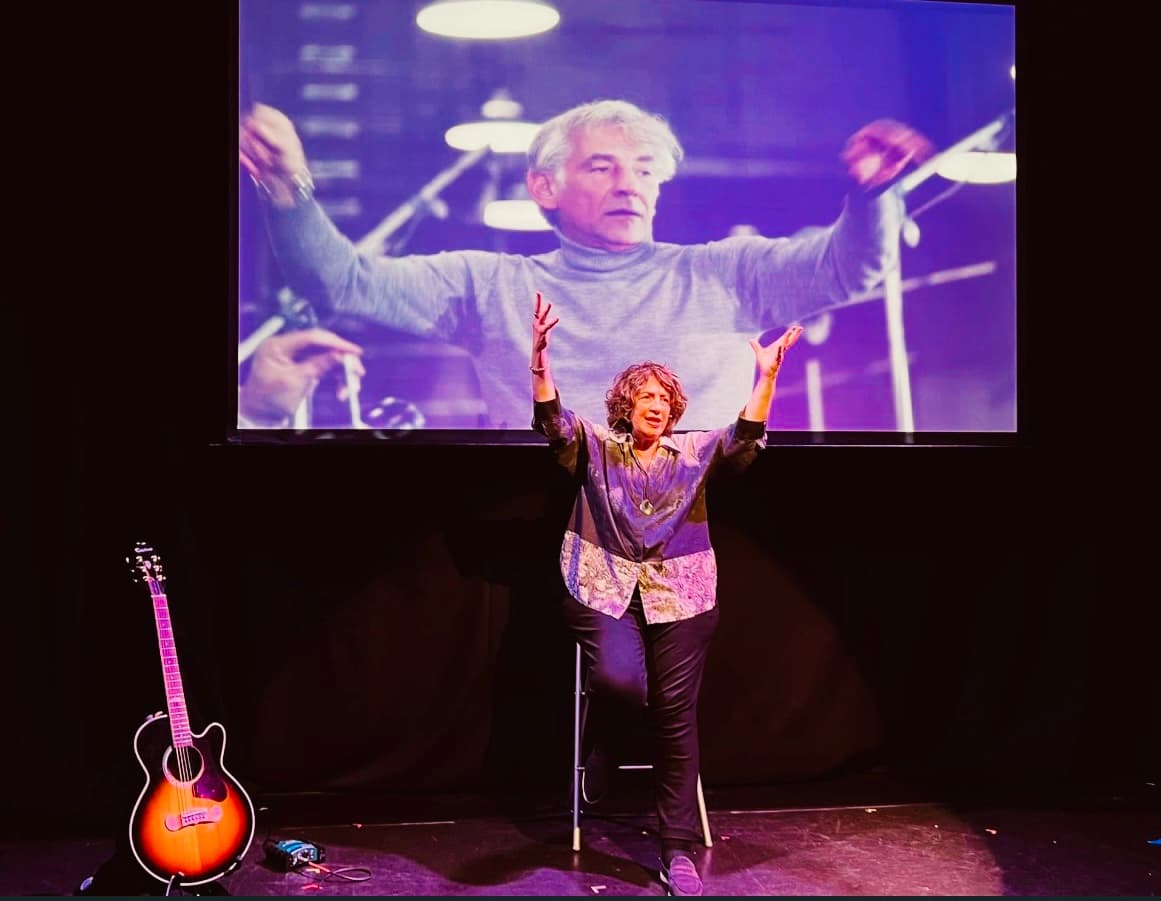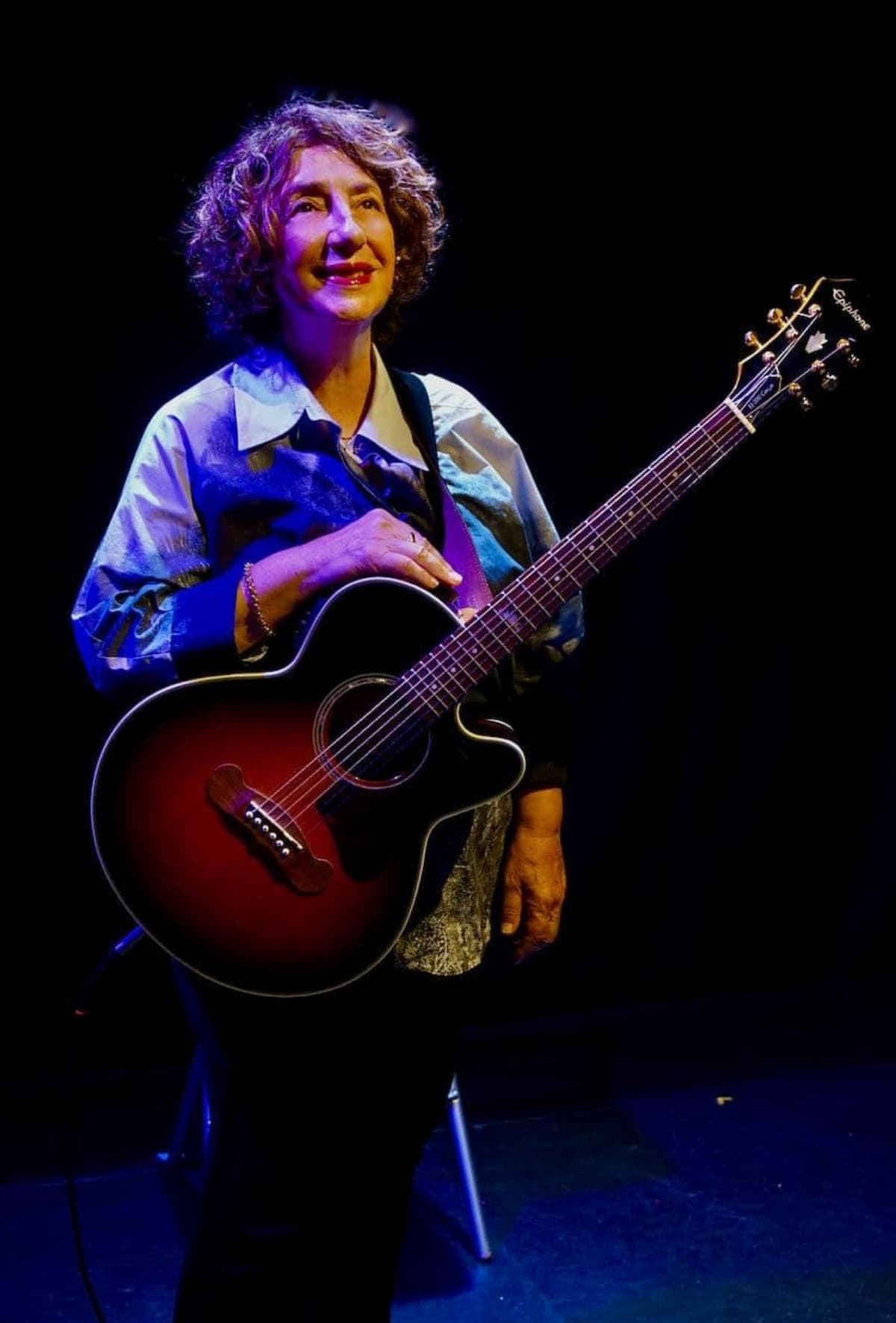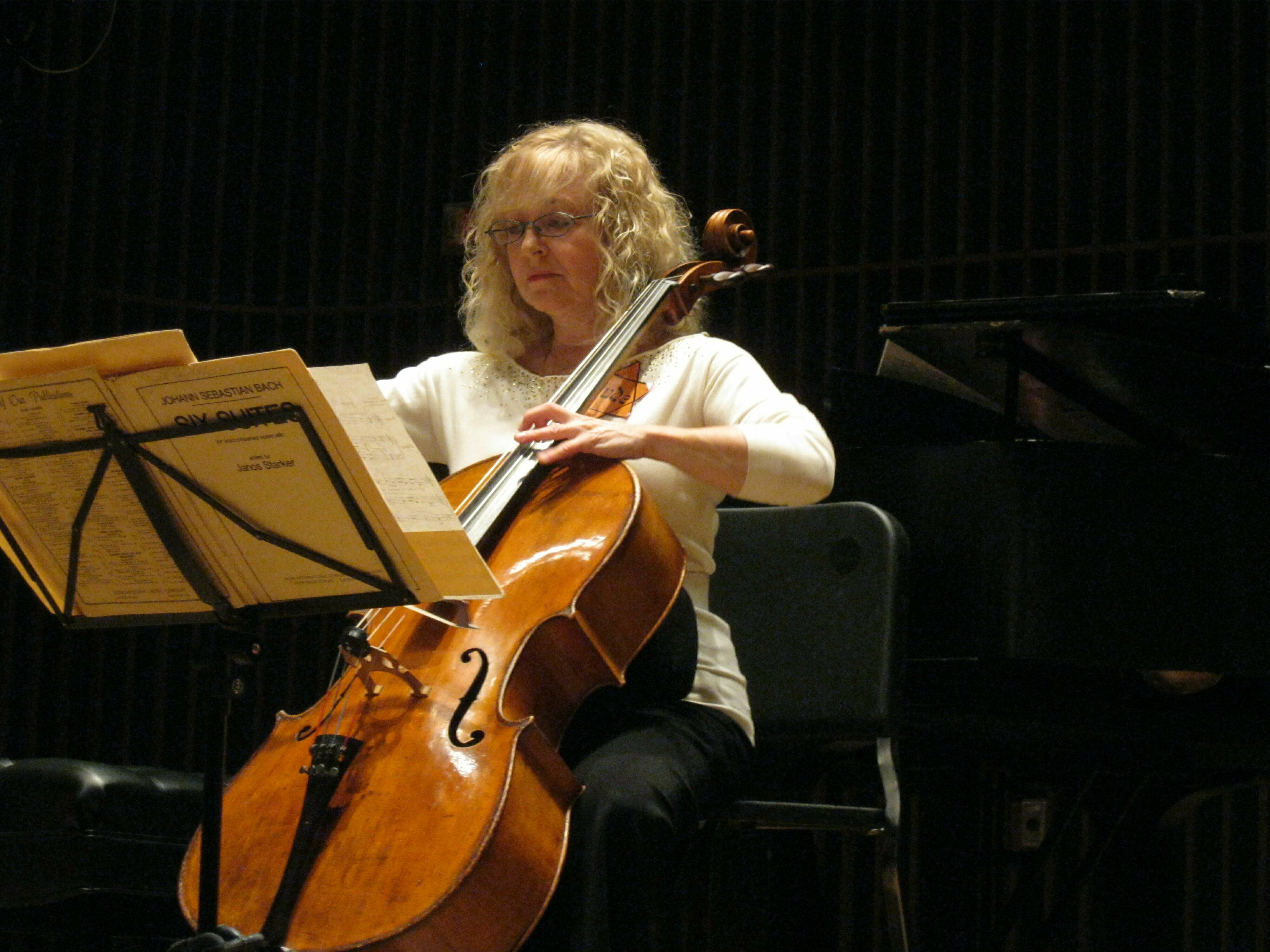What the audience doesn’t know behind the scenes typically won’t hurt their enjoyment of a performance. But these recent mishaps chill a performer’s bones even if in retrospect we like recounting these stories!

Deb Filler
A dear friend of mine, award-winning actress, comedienne, singer, storyteller, and guitarist Deb Filler was performing a one-woman show at the Edinburgh Fringe Festival. Originally from New Zealand and now a Canadian, appearing at this prestigious festival to present her one-woman multi-character musical show is, to put it mildly, a triumph. They asked her to perform 24 show evenings of “Kravitz, Cohen, Bernstein, and Me”—her hilarious quest to meet “The Three Lennys.” Leonard Bernstein looms large in her life.
Leonard Bernstein: West Side Story: Symphony Dances – I. Prologue (New York Philharmonic Orchestra; Leonard Bernstein, cond.)
At one of her shows, the jack of her electric acoustic guitar suddenly stopped working after a fall the previous night. By crunch time Deb and her technicians had come up with a solution—using a small guitar-height microphone in a stand. Never mind that she had to run back to the fixed microphone every time the guitar was called for. Live performance is often about flying by the seat of your pants.

Deb’s production manager took the instrument to the guitar repair shop early the following morning marking it ‘urgent’ and fortunately the guitar was repaired that morning. Deb paid the shop owner by 10:30 am and the production manager promised to deliver the instrument to the show that evening, with plenty of time to spare before the performance sound check.
Three cameras were scheduled to film the show that evening. Deb’s full day entailed meetings with promoters and producers, prepping the camera crew for the show, and getting her hair and makeup done.
Deb arrived at the theater ready to go a half hour prior to showtime. It didn’t take more than a second to realize something was seriously amiss. The guitar stand was empty, her instrument nowhere in sight. A dozen attempts to reach the production manager by the junior stage manager came to no end. What to do? The instrument was still AWOL 20 minutes to show time, then 10 minutes, 5, then curtain! The camera crew was set up. The house was packed. Deb had never delayed the start time of a show in Edinburgh because of the extremely tight turnaround between shows. Everyone was frazzled, as throughout the music-laden show Deb sings and plays 22 pieces. The stage manager, trying to be helpful, wondered, could Deb perform with no guitar? What? Mime the playing for the cameras? Not an option.

After several frantic minutes, ten minutes past start time, the recalcitrant production manager was finally located. She’d left the guitar at her flat forgetting that she’d promised to bring it. Chagrined, she hopped on her bike, rode home, got the instrument, put it on her back, and raced back to the theater. Despite apprehension, Deb had no choice but to start the show without the guitar. Fortunately, one of the opening numbers features Deb exuberantly conducting March of the Toreador from Bizet’s Carmen. Did I mention she had visions of her guitar flying off the production manager’s back into the busy streets, splintered beyond repair?
Georges Bizet: Carmen Suite No. 1 (arr. A. Toscanini) – V. Les Toréadors (Harmonie Ensemble, New York; Steven Richman, cond.)
Several minutes into the show Deb’s guitar was surreptitiously slipped onstage by one of the venue technicians. Of course, it needed tuning, which Deb did in the middle of the show, acting as though this happened every night, making the audience chuckle while her heart slowly, slowly resumed to a normal pace.

Janet Horvath performing with the Minnesota Orchestra
Before cell phones, car trouble could be a disaster as I once experienced. I was on my way to a Minnesota Orchestra performance on a bitterly cold night. I carefully warmed up the car before I loaded my precious cello into the back seat. As I drove into the city the highway was almost deserted. Blowing snow made the visibility next to nil. Suddenly the dashboard lit up like a Holiday tree, flashed several times, and the entire car went dead. Total electrical failure. The car coasted to a complete stop as I frantically tried to steer it to the shoulder of the road. Even the power steering was affected!
What to do? I’d ground to a halt between exits and there would be no way I could make it while carrying the cello. Did I mention that since it was so frigid out, I’d decided to wear my mother’s vintage, full-length fur coat I’d inherited but rarely wore? I got out of the car, locked it firmly, and started to run along the highway, the hem of the coat flapping in the wind. I was terrified the cold would affect the cello. Concert time was looming.
After several frantic minutes, a car pulled up. The driver flung his car door open and shouted, “Get in! It’s ridiculously cold to be out wandering on the highway!” What to do? I had to trust he wasn’t a serial killer. I had to rescue the cello. I got in. “Where to?” he asked. I told him I was on my way to Orchestra Hall in downtown Minneapolis. “Please hurry. I’m almost late for the concert!” The driver stepped on the gas and within a few minutes he deposited me at the stage door.
I raced into the backstage area like a crazy woman blurting out the story to Tim, our stage manager. He knew what to do. We jumped into his car parked on the loading dock and drove as fast as we dared on the icy roads to where I had abandoned my cello (and car.) As we closed in on the spot on the highway, I noticed a tow truck pulled alongside my cello (and car) ready to tow it off the highway. We got there just in time to avert catastrophe: the cello (and car) taken to some deserted lot far away.
Gratefully I retrieved the cello, left the car for the tow truck, and Tim made a U-turn to return to Orchestra Hall at warp speed. With only moments to spare before the downbeat, the cello returned to room temperature and my heart slowly, slowly resumed to a normal pace. No one could’ve known, why my vibrato was extra intense and triumphant as I played the cello opening to Ein Heldenleben by Richard Strauss.
For more of the best in classical music, sign up for our E-Newsletter
Richard Strauss: Ein Heldenleben (A Hero’s Life), Op. 40, TrV 190 – Der Held (The Hero) (Richard Strauss 150th Anniversary “Ein Heldenleben” Orchestra; Ken-David Masur, cond.)



